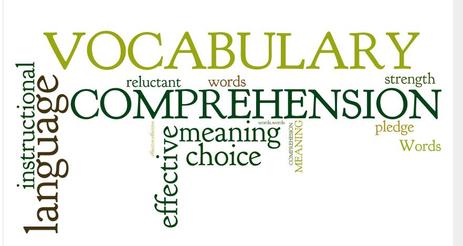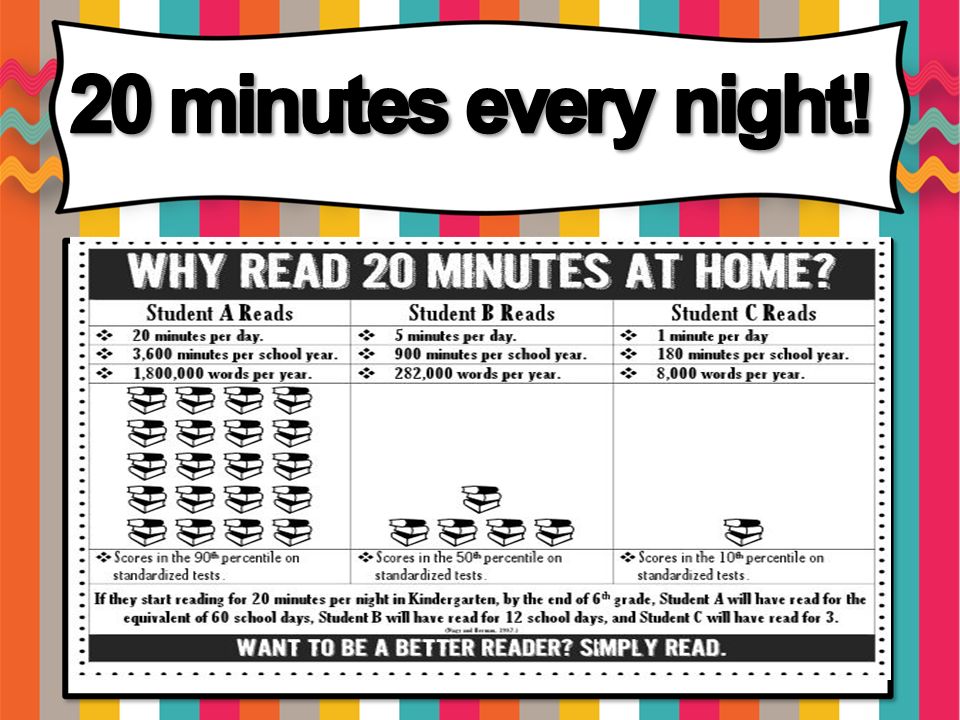
What is It?
Also known as word-stock, vocabulary is the body of words used in a person’s particular language. It is usually developed with age and is an essential tool for communication and obtaining knowledge.
What Does Research Say?
- Why is Vocabulary Important?
- It improves reading comprehension
- Words are the vehicles to communication
- Vocabulary helps children think critically and think about the world
- Why does Reading/Talking Increase Vocabulary?
Just 20 minutes a day of reading can tremendously increase a child’s personal vocabulary bank. Even having meaningful conversations with a student/child can provide beneficial expanses for a child’s vocabulary. The figure below shows the importance of reading every day. Children should be reading at a minimum of 20 minutes daily!

Reading comprehension is the ultimate goal of reading. However, a healthy vocabulary can increase all areas of a person’s life. Vocabulary increasing listening, speaking, reading, and writing skills. Furthermore, a good vocabulary can eliminate frustrations that would arise if a child had a poor source of vocabulary.
Strategies for Vocabulary
There are many, many strategies a teacher or parent can use to practice reading vocabulary skills. I am providing 5 easy strategies that can be implemented to create fun, engaging vocabulary practice lessons.
|
Keep it Fresh
How many people do you know that want to do the same old boring thing day after day? Zero. Neither do our students. Switch up teaching styles, add in fun games, and make vocabulary exciting! |
|
Use Tiers
There are 3 tiers of vocabulary that should be acknowledged when preparing vocabulary lessons. Tier 1- these are the basic words that do not need instruction. Tier 2- this tier includes high frequency words that are used to discuss more complex issues through a variety of contexts. Tier 3- these words are very particular, low frequency content words. Tier 2 will be the most frequented words taught so that students are knowledgeable of terms they will encounter across multiple texts. |
|
Set Realistic Expectations
Are you making goals your students can realistically achieve? If the expectation is to have a goal of learning 20 new vocabulary a week, would your student be able to successfully reach that goal? When creating vocabulary goals it is important to remember the levels of learning for your students and create expectations that he or she can confidently achieve. We want our students feeling positive about their successes and not frustrated because we created goals that were not probable for some students. |
|
Visit Vocabulary Regularly
When a chef is cooking a meal, does he or she let the dishes on the backburner stay untouched while the front dishes are being prepared? No! Of course, the backburner dishes don’t have to be stirred as often as the front dishes, but the back dishes still have to be tended to regularly to keep from burning. The same concept should be applied to teaching vocabulary. Once the students have proficiently learned a set of vocabulary be conscious to revisit them on a regular basis to prevent the students from forgetting the words and the terms. |
|
Word Wall
Word walls are a great visual aid for any age student. When grouping the words, consider grouping them by word families (roots or tier 1 meanings). Use the wall to review the words. Point them out and use them in daily teachings. |
Example Video
The link below is to a fun video to practice vocabulary.
https://www.youtube.com/watch?v=Oxw6FoUNeT4